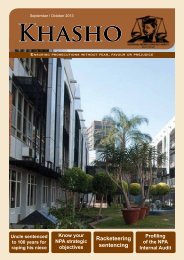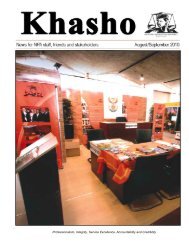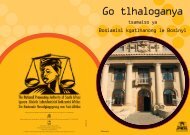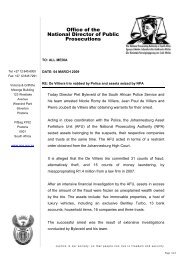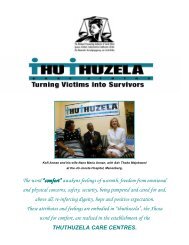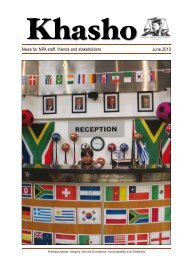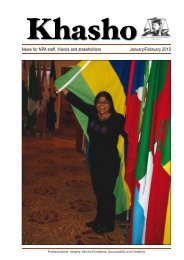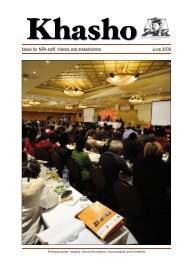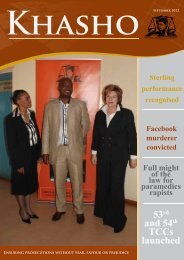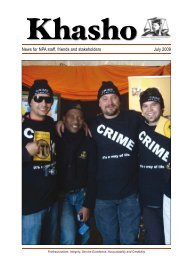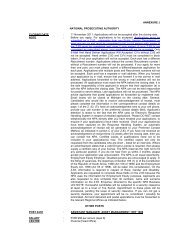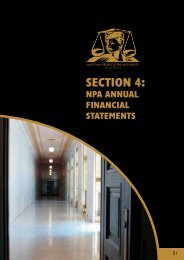Khasho July 2010 - National Prosecuting Authority
Khasho July 2010 - National Prosecuting Authority
Khasho July 2010 - National Prosecuting Authority
You also want an ePaper? Increase the reach of your titles
YUMPU automatically turns print PDFs into web optimized ePapers that Google loves.
4NPA NewsBeing the people’s lawyerTebogo Seate andNomilo Mpondo– following in the footsteps of MadibaThe month of <strong>July</strong> was dedicated to honouring a great son of the soil, as he celebrated his 92 ndbirthday. We are talking about none other than Madiba himself.Nelson Mandela is a lawyer by profession. He went toFort Hare University in pursuit of a law degree. He laterworked as an articled clerk at the then Johannesburg law firmof Witkin, Sidelsky and Edelman. While working there, hecompleted his BA degree at the University of South Africathrough correspondence, after which he began his law studiesat the University of the Witwatersrand.He qualified as a lawyer in 1942. With his law degree, he wantedto protect his fellow black countrymen against the repressiveapartheid system. Together with Oliver Tambo, he establishedthe country’s first black law firm. His work as a lawyer gavehim a better insight into how the system was affecting his fellowcountrymen.However, his career as a lawyer was unfortunately very shortlived,as his involvement in politics and subsequent arrest finallytook away the ‘people's lawyer’. Later in his life, while in prison,Mandela studied for a Bachelor of Law through the University ofLondon’s External Programme. His deep-rooted passion for lawclearly shows that he had the interest of people whom he wantedto defend and protect at heart at all times.Being from the legal profession, and therefore being ‘one of us’, isthere anything that we can learn from Madiba? Can his life storybe of any value to us as we attempt to ‘represent and act on behalfof the people in all criminal trials’ as is envisioned in the NPA'sService Charter, and in ultimate fulfilment of our vision, ‘justicein our society, so that people can live in freedom and security’?<strong>Khasho</strong> spoke to three prosecutors, and this iswhat they had to say:Nico Benson, Senior State Prosecutor, Northern Cape DPP,Kimberley officeI get to feel like a people’s lawyer when I see both the victim andthe accused getting assistance. Both the victim and the accusedmust be treated with respect and dignity. Wrongful arrest goesagainst our vision of justice in our society… It is unfortunateto have someone spend time in jail and later find that he waswrongfully accused. Being the people’s lawyer is serving boththe victim and the accused.Moemedi Mabogoane, Senior State Prosecutor, NorthernCape DPP, Kimberley officeBeing the people’s lawyer gets to be fulfilling when I see thevictim of crime leaving the court satisfied, irrespective of whetherthe accused has been found guilty or not.Nelson Mandela as a young lawyer before being imprisoned andlater becoming President of the country. (Image: Wikipedia, thefree encyclopedia)Nkhetheni Munyai, Senior State Prosecutor, North WestDPP, Mmabatho officeAs prosecutors, we are truly inspired by the dedication andtireless efforts of Mr Rolihlahla Nelson Mandela in his fight forfreedom, justice and human rights. As ‘people's lawyers’ likeMr Mandela, we must continue to serve the people of SouthAfrica, in their diversity, with pride to ensure that justice isdispensed evenly, irrespective of the socio-economic conditionsthat may affect particular sections of the various communities.We will continue to play a proactive role to ensure that whatMr Mandela fought for is realised in our justice system. ToMr Mandela we say: “You are an inspiration to the nations.”Did you know?When he was still practising as a lawyer, Madiba developed eightpropositions that he used in his day-to-day life as a lawyer. Theselater came to be known as Mandela’s eight lessons in leadership.(www.time.com)• Courage is not the absence of fear: it is inspiring others tomove beyond it.• Lead from the front, but don’t leave your base behind.• Lead from the back and let others believe they are in front.• Know your enemy and learn about his favourite sport.• Keep your friends close and your rivals even closer.• Appearances matter, and remember to smile.• Nothing is black or white.• Quitting is leading too.Professionalism, Integrity, Service Excellence, Accountability and Credibility
NPA News5Heeding the 67-minute callTebogo SeateOn 18 <strong>July</strong> <strong>2010</strong>, Mandela’s 92 nd birthday, the Nelson Mandela Foundation urged people to devote67 minutes of their time to help improve the conditions of their communities. The 67 minutes representthe number of years that Nelson Mandela spent serving his community, his country, and the world atlarge. The United Nations has adopted this day as International Mandela Day, when people across theglobe are encouraged to celebrate Nelson Mandela's life and legacy. Many NPA employees heededthe call. Some of them came forward and told <strong>Khasho</strong> what they did on that day.Billy Mabena, Information Management Service Centre(IMSC)To celebrate NelsonMandela’s birthday,Billy decidedto spend some timeat LeamogetsweHome of Safetyin Atteridgeville,Billy Mabena of IMSC, VGM Building,spent more than 67 minutes atLeamogetswe Home of Safety.where he spentmore than 67 minutesplaying withthe kids, assistingwith the preparationof their breakfastand lunch, andalso taking oversome of the dailychores at the home.“The day was reallyenjoyable andthe residents of the home were very welcoming,” he said. Toemphasise the legacy of the <strong>2010</strong> FIFA World Cup, the NPAdonated four soccer balls to the home. “The soccer balls werethoroughly appreciated by the children, who immediately engagedin a football match on receiving them. Needless to say,I did not miss the opportunity to show off my skills in the fieldas well, much to the kids’ amusement,” he said.Advocate Xolisile Khanyile visitsdisabled children at the IthembelihleSchool in Primrose, Germiston.Adv Xolisile Khanyile,Acting DPP,South GautengAdv Khanyile wasreally touched bythe reality of theworld of disabledchildren at IthembelihleSchool inPrimrose, Germiston.“Althoughvisiting Ithembelihledoes not formpart of the workof the NPA, I willstill go back againbecause the little that we can do will always make a difference,”she said. She was accompanied by prosecutors fromthe Specialised Commercial Crimes Unit, who spent their67 minutes distributing mini-vuvuzelas donated by BrandSA, as well as fruit, to children. The children made a lotof noise and were very excited by the warmth they werereceiving. The NPA entourage felt welcome and eager toreturn.North Gauteng DPP, Pretoria OfficeMembers of North Gauteng DPP provided soup and blankets forthe homeless outside a magistrate's court.When the advocates of the North Gauteng DPP, PretoriaOffice reported for duty at some of the dedicated WorldCup courts at night, they noticed a number of homelesspeople who were living outside the Pretoria Magistrate’scourt. Many of those people did not have sufficient beddingto keep them warm. They used plastic bags to protectthemselves from the cold. This really touched the hearts ofour colleagues, and they decided to buy blankets and soupfor the homeless people out of their own pockets. Althoughsociety views prosecutors as those who only prosecute, itshows that they also care for the community and ensure thatsocial justice is achieved in all forms. In light of a numberof cold fronts that the country experienced during winter,we sincerely hope that this charitable work helped those inneed.Professionalism, Integrity, Service Excellence, Accountability and Credibility
6 NPA NewsThreats of violenceagainst foreign nationals in South AfricaNomilo MpondoAs the whole world was united during the month of <strong>July</strong> in showing their respect for one of SouthAfrica’s greatest leaders, Nelson Mandela, and following the euphoria of a very successful FIFAWorld Cup hosted in our country, threats of violence against foreign nationals, similar to incidentsof two years ago in which 62 African immigrants were killed and thousands others displaced,have resurfaced. The government has taken note of these alleged threats and the following keymessages clarify its position.The government takes threats to security in a serious light,whether perceived or real.Government is aware of and takes seriously rumours of violenceagainst foreign nationals following the completion of the <strong>2010</strong>FIFA World Cup, the first to be hosted on African soil. Thegovernment has activated the Inter-Ministerial Committee onXenophobia, chaired by the Minister of Police. The attentionpaid to this issue at the highest levels indicates the seriousnessthat government accords to the matter. Government isreviewing the development and implementation of its currentimmigration policy. This includes devising medium- and longtermplans to sustain peaceful co-existence between SouthAfricans and foreign nationals in the country.Security forces are on the ground to ensure that peace andstability prevail across the country. These forces are on highalert and will not tolerate any form of violent behaviour byindividuals or groups of people.Government calls upon South Africans to join hands with lawenforcement authorities in maintaining peace and stability inthe country. Criminals must not be allowed to tarnish the goodname of South Africa.Fundamentally, South Africans are welcoming,tolerant and peace-loving. However, as in allsocieties, there will be elements that will exploit anysituation to destabilise communities and commitcrimes. Some of these elements are currentlyintimidating foreign nationals in order to commitcommon crimes.in the country to join in the efforts that are being made tobuild better and more cohesive communities. It is everyone'sresponsibility to maintain peace and stability in the country.The majority of visitors have singled out the humanity ofSouth Africans and their warm and hospitable welcome as keycontributors to the resounding success of the World Cup.To maintain the positive climate, South Africans, individuallyand as members of organisations, are asked to join handswith government, to act in the country’s best interests andsay “no” to xenophobia. South Africa, like most developingcountries, has many socio-economic challenges, includingpoverty, joblessness, the spread of preventable infections andthe need to improve the quality of education. These challengescan only be addressed if we work together to improve ourskills and quality of life. Violence against those perceivedto be perpetrators of crime or of usurping scarce resourceshas never worked before and the only effect it can have is anegative impact on the country’s reputation.The NPA, as an organ of state and a key partner in the JCPSCluster, reiterates government’s position of saying ‘‘no’’ toxenophobia. This is the message that we should all upholdand extend to both our immediate family members and thecommunities from which we come.Government is taking measures to act against theseelements, which will face the full might of the lawfor any anti-social or criminal behaviour. The SouthAfrican government calls on people to providethe police or community-based organisations withinformation about threats or incidents. It also callson all South Africans and foreign nationals livingProfessionalism, Integrity, Service Excellence, Accountability and Credibility
Meet the Acting DPP for MthathaLuxolo TyaliNPA Staff 7Adv Silumko NgqwalaThis edition of <strong>Khasho</strong> brings you a glimpse into the life of Advocate Silumko Wiseman Ngqwala,Acting DPP: Mthatha, who took over from Adv Humphrey Lusu in an acting capacity from 22 June <strong>2010</strong>to 31 March 2011 or when a permanent DPP for Mthatha is appointed, whichever occurs first.What challenges do you foresee?• Improving the performance of the lower courts in terms ofresources and administration.• Resistance by staff to new changes like implementing therealignment process.• Boosting the morale of staff, which somehow appears tobe low.• Increasing the capacity of the prosecutors to deal withcrime, which is rising rapidly.Are there any priority cases that are unique to Mthatha?Yes, there are cases like ‘ukuthwala’ or forced marriages thatinvolve young girls, as well as the botched circumcision casesthat are reaching alarming proportions. I have personally takenit upon myself to prioritise these cases.What do you consider to be important in leading a team ofmany prosecutors and support staff in the region?Adv Silumko NgqwalaWho is Adv Ngqwala?Born 50 years ago, Adv Ngqwala joined the Department ofJustice in 1981 as a student professional. During vacations,he worked in various districts as a court interpreter and clerkof the court. On completion of his junior degree, he worked invarious districts and rose to the ranks of district court prosecutor,regional court prosecutor, assistant magistrate, state advocateand senior state advocate. In 1997, he underwent trainingas an aspirant regional court magistrate and did his six monthsof practical training in the City of Cape Town Regional Court.In May 1999, he was promoted to the rank of Deputy Directorof Public Prosecutions (DDPP) in Mthatha. During 2001, heacted as DPP for four months in the same office.We know you have only taken the baton of Acting DPPrecently, but so far what has your experience been asActing DPP?It has been very exciting, although challenging. Notwithstandingthat, with the experience I have gathered over manyyears and due to the fact that I will be working with staff Iam familiar with, I am confident that the challenges I will befaced with will be minimised. It is not like being deployed toan office where you have never worked before.Transparency in my leadership style and direct interaction withall employees, as well as maintaining an open-door policy inhandling the affairs of the employees.Do you find your job to be fulfilling?Yes, especially the exposure to new things. The fact that itis expanding my career path will always be beneficial to myprofessional growth.Do you have any message of encouragement to the rest ofthe staff in the region?To all the NPA staff in the region, I wish to convey thismessage: “You must at all material times when you executeyour duties remember that you are not serving my interestsas your leader, but instead, be mindful of the fact that you areserving the interests of the NPA as an organisation, as well asthe interests of our beloved country, South Africa.”Do you have any strategy for dealing with partners andstakeholders of the NPA in the region?I attend structured meetings with partners and stakeholderssuch as the Justice, Crime Prevention and Security (JCPS)Cluster meetings, provincial development committeemeetings and the Criminal Justice Forum meetings, whichare chaired by the Judge-President in the province. I alsoattend stakeholders' imbizos in the region.Professionalism, Integrity, Service Excellence, Accountability and Credibility
Staff EventsNPA at the<strong>2010</strong> <strong>National</strong> Arts Festival9Tsepo NdwalazaThis year the <strong>National</strong> Arts Festival in Grahamstown had a slow start due to the <strong>2010</strong> FIFA World Cupthat was taking place concurrently with the festival. It started on 20 June <strong>2010</strong> and continued until4 <strong>July</strong> <strong>2010</strong>.The NPA was once again a participant inthis internationally acclaimed annualevent taking place in Grahamstown. TheNPA exhibition stall attracted a keen interestfrom a wide range of visitors, ranging fromtheatre-goers and jazz lovers to ordinarypeople who came to the festival seekinginformation.Members of the public showed a keen interestin maintenance matters, court interdicts,domestic violence, children’s rights andthe relatively new phenomenon, humantrafficking. Prosecutors from the DPP officein Grahamstown were able to interact withand educate the public about the work ofthe NPA. Their knowledge of the law reallymade a difference, as people who came withspecific legal queries were assisted on thespot.One of the attendants, who hailed from CapeTown, had a query about a particular casein which her son was shot in the crossfireduring a police raid on gangs in Cape Town.The DPP Western Cape office was calledimmediately to enquire on her behalf.Sufficient answers relating to the case wereprovided and it was encouraging to see howhappy she was when she left the stall. Therewere many other cases on which prosecutorshad to shed some light.For the young ones, the drawing competitionwas the main attraction. Droves of childrenand their parents came to the exhibition stallto enquire about the competition. On 3 <strong>July</strong>,a panel of adjudicators selected the bestdrawings and the winners were announced.Schoolchildren visit the NPA exhibition stand at the Grahamstown Festival.Other activities that took place at the festival includedtheatre (stage plays), young boys posing as statues nextto their loyal donkeys, dance, jazz music and many otherforms of art, some bordering on the weird side, but veryinteresting and amusing at times.It is a fulfilling experience to be part of these social eventswhere a platform is created to educate members of thecommunity about the justice system of the country andother services of government.Professionalism, Integrity, Service Excellence, Accountability and Credibility
10NPA EventsService FairMedupe Simasikucomes to the Free StateThe NPA, together with various stakeholders in the JCPS Cluster, took service delivery to Allanridge(Nyakallong) community in the Free State near Welkom. This took place in the form of a servicedelivery road show that took place on Saturday, 24 <strong>July</strong> <strong>2010</strong>, at Allanridge, Nyakallong SportsGround.community very well, and played an importantrole in assisting the planning team to understandthe people’s needs and challenges as far as thecriminal justice system is concerned.Members of the community who were interviewedby <strong>Khasho</strong> said they were very grateful thatorganisations such as the NPA had finally reachedthem. They had only heard about the NPA on radioand television, but never thought they would oneday interact with officials from the organisation.“At least we now know what the NPA does,because we have always thought that the NPA isfor high-profile people only,” said one communitymember.Allanridge community members queue for the NPA's services.This was the third community outreach road show led by theNPA, after two successful road shows held in KwaZulu-Natal in 2009 and in Limpopo earlier this year. The ultimateplan is to have a roadshow in all the provinces of South Africa,where NPA staff members can educate communities aboutissues such as maintenance, domestic violence, child justiceand other concerns that are pertinent to each target community.All stakeholders from the JCPS Cluster were present, therebyenabling people to understand the criminal justice system asa whole. Other partners that participated were the Departmentof Justice and Constitutional Development, the South AfricanPolice Service, Legal Aid South Africa, the South AfricanSocial Security Agency, and various departments of the FreeState Provincial Government, Matjhabeng and Nala localmunicipalities, as well as various NGOs.The purpose of this road show was to assist the communitiesof Matjhabeng and Nala (Wesselsbron and Bothaville) andsurrounding communities with various services, ranging fromcase reporting, maintenance enquiries, pending case enquiries,ID applications and enquiries, general service delivery queries,as well as legal advice. Despite the fact that the community waslaying to rest the local ward councillor, Mrs Nontombi Mankai,who had been part of the team that had planned the roadshowuntil her sudden death, attendance was impressive. Being alocal ward councillor, Mrs Mankai understood the needs of herMr Thabo Diphoko, a maintenance prosecutorfrom Odendaalsrus, gave a very useful lectureon maintenance issues, because this is one areathat is often misunderstood by the community. Healso promised the community that the NPA wouldalways be available to assist them with any maintenance-relatedproblems.Colonel Cynthia Molale, Acting SAPS Cluster Head forWelkom, urged the community to work very closely with thepolice. She said that the police in that area were under-resourcedand therefore encouraged people to provide them with relevantinformation that could help curb crime in that area. The youthwere strongly warned to stay away from crime.The event was very successful indeed. Although it was mainlyspearheaded by the NPA, it was a joint initiative with othergovernment players in the criminal justice system. Otherplayers who are not necessarily members of the JCPS clusterwere also invited to attend. An example was New Start, anNGO that specialises in HIV/AIDS voluntary counselling andtesting. This may not be part of the criminal justice system, butshows that we are all partners in making sure that people knowtheir HIV status and are able to take care of themselves.Public education is a principle that is customary in all spheresof government. Participation is important to make sure that thegovernment addresses the real needs of communities in the mostappropriate way. Participation also helps to build an informedand responsible people.Professionalism, Integrity, Service Excellence, Accountability and Credibility
NPA Staff11Meet the new Acting DPP for South GautengCharlene Labuschagne andAdv Raymond MathenjwaWhat has been yourexperience so far asActing DPP?It is quite challenging to bethe Acting DPP, as it takesa lot of time to deal withthe various challenges andtasks. It is extremely exciting,because I know thatour efforts move the organisationforward; even ifit is just bit by bit. Makinga difference is what drivesme. Being part of thistransforming organisationis in itself very motivating.NPA values benchmarking exerciseMoroko MabowaGood ethics is the core of sound corporate governance.As proactive steps to encourage ethical behaviour andestablish sound ethics management practices, the NPA hasadopted its own organisational values and code of ethicssince 2008. Using the services of Ethics South Africa, theNPA has conducted a survey to determine the extent to whichthese values of integrity, professionalism, credibility, serviceexcellence and accountability are being practised in the NPA.A total of 521 computer-assisted telephonic interviews wereconducted with personnel across all business units and ranks.The main objectives of this project were as follows:• To enable the NPA to make an informed decision on itsethics priority list.• To provide a much better understanding of how big the gapis between ‘what is right’ and ‘what is happening on theground’.• To indicate the challenges faced by the NPA.• To act as a barometer of the NPA’s views on ethics trendsin the organisation.Adv Xolisile KhanyileSenior Advocate Xolisile Khanyile has been appointed to act as Director of Public Prosecutions(DPP): South Gauteng from 1 June <strong>2010</strong> to 31 March 2011 or when a permanent DPP is appointed,whichever occurs first. She is a highly skilled prosecutor with more than 12 years' experience.Adv Xolisile Khanyile:Acting DPP: South GautengWhat challenges do you typically face as Acting DPP?The many vacancies in the lower courts are problematic. It isnot easy to fill the vacant positions, since for some or otherreason the NPA is struggling to attract talent from outsidethe organisation. Our own prosecutors are promoted, therebycreating new vacancies. We have sent many of the high courtprosecutors to the lower courts to deal with trial matters toaddress the backlog. The effort is paying off. The many unitsin the NPA seem to be disconnected and it impacts on theoverall functioning of the organisation. It would be valuable ifthis could be addressed. It would also be good if prosecutors atall levels could support and understand the need to shift theirown paradigm. An example would be if lower court prosecutorscould gain confidence and feel competent in legal drafting soas to be able to pursue criminal forfeiture applications, forinstance.continued on p 12awareness on the code of ethics and also on the servicedelivery hotline. The NPA does not have a strong ethicsmanagement system. A lot of effort therefore needs to bedone to ensure that the ethics management system of theorganisation is solid.RecommendationIt is recommended that the NPA should conduct a leadershipretreat, attended by top management and senior managers fromall areas of the business, where critical introspection and opencommunication is required to reflect on the results of the NPA'sethics indicator of 2009.The organisation should provide for operational implementationby developing a sustainable NPA-wide cross-departmental andcross-divisional ethics management strategy. The organisationalso needs to conduct ethics training interventions at all levels,provinces and business units of the organisation to addressgaps regarding awareness of the code of ethics and the NPA'svalues.FindingsThe findings show that generally staff members areaware of the NPA's values and code of ethics, but arenot familiar with the content. Few utilise the content toguide their actions and decisions. There is a need for moreAs a way forward, the NPA intends to develop an intensiveprogramme to institutionalise the values and enable staffmembers to live and internalise them and also be inspired toalign themselves with the NPA's vision of “ensuring justice inour society, so that people can live in freedom and security”.Professionalism, Integrity, Service Excellence, Accountability and Credibility
12NPA StaffFrom senior corporate manager to prosecutor:Natasha RamkissonAdv Mfanafuthi Simelaneengage directly with the public. At the same time I find itstimulating and interesting because one gets to see the endproduct. Your contribution to justice is immediate and the endproduct is more tangible.Have there been any challenges thus far?Yes, I found my first day in court to be the most challenging.It was an intimidating experience because it was my first timehaving to observe the protocol in a ‘real’ situation. My firstcase was one of theft, where the accused got a three-yearsentence. He had a previous history of theft.Have you always wanted to get into the legal profession?Not really. My interest in law was sparked when I joined theNPA. I looked at the environment and realised that I wantedto be a part of it.Do you have any future aspirations?Yes, to finish my doctorate in law. I have already submittedmy research proposal to the University of Johannesburg.Adv Mfanafuthi SimelaneWhen did you start at the NPA?I started with the NPA in 2002 as a senior corporate managerand held this position until April <strong>2010</strong>. I am currently anadvocate in the Pinetown Regional Court.Can you explain how this happened?On completion of my master’s degree in Law, I approachedthe NPA to afford me the opportunity to practise because Ihad a keen interest and the tools to pursue that interest. Thiscame at the right time when the NDPP emphasised that seniorprosecutors needed to be involved at the ground level ofprosecutions. Therefore, my ambition fitted in perfectly withthe objectives of the NPA.What did you study?I started off studying management-related courses atuniversity and I hold the following qualifications: Diplomain Management, Diploma in Management Development,Bachelor of Arts and Master's in Public Administration.My legal qualifications are: Diploma Juris, LLB and LLM(Master’s in Law). I obtained all these qualifications studyingpart-time.How are you finding court work?It is interesting, challenging and stimulating. I find it morechallenging than my previous job because it enables me toThere are lots of NPA employees who are studying parttime.Do you have any words of encouragement for them?Studying while working entails a lot of sacrifices, because youmust be able to manage your study time and still have timefor other aspects of your life. I am an avid weight-lifter, so Ialways ensure that I have time for my work, studies, familyand going to the gym. You must know how to prioritise andset goals for yourself.continued from p 11It is positive that one of the deputy directors in SouthGauteng, Senior Advocate Zaais van Zyl, has for sometime already been providing legal drafting training at theDPP offices.Do you find your job fulfilling?It is! While I was still a deputy director, I had a vision ofhow to improve our services as prosecutors. I had a lot inmind. It is presently very exciting to have the opportunityto make that vision a reality.Do you have a message of encouragement to the restof the organisation?Move on. Move forward. Be focused. We know why weare in the NPA. We are here to serve the people. We mustfocus on our core function, which is to ensure justice forthe victims of crime by prosecuting without fear, favouror prejudice.Professionalism, Integrity, Service Excellence, Accountability and Credibility
14 NPA NewsWhat a spectacularRegional Communication ManagersSoccer World CupThe year <strong>2010</strong> will certainly be remembered by most South Africans for many years to come becauseof the highly successful FIFA Soccer World Cup tournament that was hosted by this country.Most people generally agree that South Africa organised oneof the most beautiful showpieces – an achievement thatnot only put South Africa on the map, but brought honour andglory to the African continent as well. What do NPA employeesthink? Are we exaggerating our achievement? What contributesto a really successful event? <strong>Khasho</strong> interviewed a few of ouremployees to get their comments:Adv Bakedi Maoke, DPP North GautengI was an acting senior for the night shift team that worked duringthe operation of the Soccer World Cup-dedicated courts. I couldtherefore relate to the slogan, “Feel it. It is here!” However, froma justice point of view, the successful operation of the dedicatedcourts proved to the world that South Africa’s standards wereon par with global prosecution standards. Cases were finalisedquickly and this sent a message to all visitors that South Africatakes justice very seriously, and that the government goes theextra mile to ensure that visitors and tourists are safe and securewhile inside the country. Having successfully built this kind ofconfidence, I am sure we are going to see repeat visits from thosetourists, which is good for the economy.Adv Emely van Wyk, DPP MthathaThe successful hosting of this world-class event by South Africanot only put our country on the map, but also evoked a very strongsense of patriotism in all South Africans. Even people like me,who had not been interested in soccer before, learnt somethingbeyond the game during the Soccer World Cup, which also gaveus a sense of pride that South Africa is a nation of winners, eventhough our soccer team did not win the tournament.Advocate Carel van der Merwe, DPP Free StateThe dedicated courts ran according to plan, and there were notany hiccups that could not be addressed as and when necessary.The statistics speak for themselves and one can only say that thiswas a job well done. The successful handling of all cases showsthat we managed to serve the international world with prideduring the soccer tournament and we can always try to do better.It was a great tournament indeed for all football lovers.Advocate Du Toit, DPP Free StateI would like to congratulate everyone who was involved and alsothank them for the team work with all JCPS Cluster members.I also think that it will be a good gesture to inculcate the spirit ofspeedy case handling as we did with the World Cup. It is not aneasy task, I know, because we had more resources then, but wecan build on the courage we displayed at that stage.Charles Eybers, DPP South GautengSorry to burst the bubble. I hold a minority view, which says thatwe should never have bid for the hosting of the FIFA World Cup.My view is that the billions we spent on stadiums, which are soonto become white elephants, could have been spent on prioritieslike education, health and welfare. The other infrastructurespending on roads and buses is acceptable, as citizens derive adirect benefit and we don’t have to thank the hosting of the WorldCup for it – it’s the same budget that we would have used asa priority project. Our children and their children will have toservice the debt.Babalwa Sijila, senior administrative assistant: DPP WesternCapeIt was the most successful event South Africa has ever organised,from the opening function to the very last game of the tournament.There were no incidents that posed a security risk, meaning thatthe planning was good to the very last detail. I have never feltso proud to be South African as I did during the month of theWorld Cup. There is just no way anyone could ever say that weare exaggerating our achievements. I mean, we had a top-notchtransport system, a very stable security base system, <strong>2010</strong> mobilecourts to deal with cases and incidents happening in and aroundthe stadiums and accommodation was available in all the citiesfor fans and the teams. It was a success on many levels. Becauseof all the hard work we put into making the tournament a success,South Africa is now respected and well recognised by the world.Kegomoditswe Mosweu-Katane, human resouces officer,DPP North WestI enjoyed the greatest moments of the World Cup, seeing Mzansi,especially on Football Fridays, looking fabulous with BafanaBafana T-shirts. It was more interesting to be part of the euphoriawith vuvuzelas and makarapa in the fan parks.Adv Sandan, DPP Port ElizabethThe pessimists of the past should come forward and raise theSouth African flag with patriotism, because we have exceeded allstandards in the world.Adv Jason Thysse, DPP Port ElizabethWe are definitely not exaggerating our achievement Not only willthe year <strong>2010</strong> be remembered for the FIFA World Cup, but alsobecause we opened our hearts and hands to the rest of the world.We received them with open arms and showed the world howunited we are. We displayed ubuntu of the highest level. I woremy Bafana Bafana shirt with pride and will continue to do so.Professionalism, Integrity, Service Excellence, Accountability and Credibility
NPA News15Mental Illness and Awareness Month:mental health problems in the workplaceBy Phuthi SemenyaAccording to the national health awareness calendar of the Department of Health, <strong>July</strong> was declaredMental Illness and Awareness Month. This article seeks to raise awareness about the impact ofmental illness in the workplace, and to increase employees’ participation in the drive to reduce theimpact of mental illness on individual employees and the organisation as a whole.What is mental illness?Mental illness is a medical condition that disrupts a person’sthinking, feelings, mood, ability to relate to others and dailyfunctioning.Serious mental illnesses include major depression, schizophrenia,bipolar disorder, obsessive compulsive disorder, panic disorder,post-traumatic stress disorder, and borderline personalitydisorder.The impact of mental illness in the workplaceResearch has shown that the cost of mental illness in the workplaceis enormous, and therefore it is essential for businesses, bothpublic and private, to contribute to the promotion of mentalhealth and address issues of mental illness in the workplace.Mental illness has the following effects in the workplace:• More annual sick days.• High rates of absenteeism.• Lost productivity.• Overwrought work relationships.• High health expenditure.• Loss of employment.Stigma related to mental illnessThe cost of mental illness in the workplace is exacerbatedby the fact that the impact of mental illness is often ignoredor overlooked. The illness tends to be hidden, distorted,misunderstood, stigmatised or even ridiculed in the workplace.This creates a lost opportunity for the effective managementof mental illnesses for both employees and managers, therebyhindering the process of early recovery and reintegration, leadingto a ripple effect of the problem situation.Signs and symptoms of mental illnessDepending on the nature of the illness, the affected person maymanifest the following signs and symptoms:• Diminished energy.• Loss of interest in activities that one used to enjoy.• Loss of appetite or weight.• Recurrent thoughts of death or suicide, oversleeping, cyclingbetween elevated and depressed moods, highly energetic ordepressed moods, restlessness and fatigue.In some psychotic illnesses, the person may experiencehallucinations, delusions and disorganised behaviour.Please note that only a qualified doctor or health practitioner canformally diagnose mental illnesses, but it is important to knowand recognise the warning signs to take appropriate steps.Tips in dealing with mental illness in the workplaceFor the affected employees• Know the signs and symptoms of your illness and rememberthat you are not alone.• Talk to the people you trust: your family, friends, colleaguesor manager.• If the problem persists, talk to your doctor or mental healthprofessional for proper diagnosis, treatment and psychoeducation.Contact the Employee Health and Wellness officefor assistance.• Treatment alone may not help. Assume your responsibility asa patient: your attitude, perception, behaviour and insight intothe nature of your illness may count, especially in preventingrelapses.For supervisors and managers• Learn about mental health and mental illnesses and ensurethat your staff gets education and support.• Self-awareness is crucial. Ask the question: “What ismy attitude towards mental health illness and ill-healthabsenteeism, especially in a stressful and highly demandingwork environment?”• Manage absence due to ill health. Consider possible optionsfor reasonable accommodation, talk to the Labour Relationsoffice for advice.Let’s talkShare your knowledge and send your ideas and advice tothe Employee Health and Wellness Unit on 012 845 6906 or012 845 6864, or send an e-mail to fsemenya@npa.gov.za.Professionalism, Integrity, Service Excellence, Accountability and Credibility



